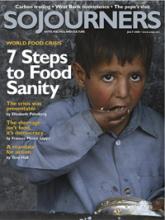News broadcasts report a horrific “world food crisis.” But there is no food shortage. In fact, there’s more than enough food to make us all chubby—even counting only the “leftovers,” what remains after turning more than a third of the world’s grain and fish catch into feed.
The forecast for world cereal production in 2008 stands at a record 2,164 million metric tons, says the U.N.’s Food and Agriculture Organization. That’s an increase of 2.6 percent over last year, the previous global high.
Again: The shortage is not of food. It is one of democracy. At its heart, democracy means power distributed so that citizens’ interests—our values and our common sense—show up in policies.
Yet, can you imagine citizens anywhere setting things up so that just one company, controlling a huge share of the entire world’s grain trade, could enjoy a 65 percent profit surge last year, while at the same time food price hikes are pushing 100 million more people into poverty and hunger? (The most recent quarterly Archer Daniels Midland profit surge came largely from the company’s financial division that makes money on price volatility via commodity futures trading.)
Or think about this: In a world where even before this historic price climb almost a billion people couldn’t afford enough to eat, what citizen would say, “Why don’t we start shifting prime farmland into agrofuel production and push prices still higher!?”
Neither could happen if citizens had real power. Each violates our common sense and our hardwired human need for fairness.
Read the Full Article

